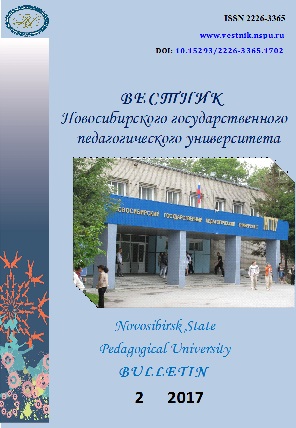Интегративное ономастическое пространство
регионального варианта русского языка в условиях билингвизма
Integrative onomastic space of a regional variant of the Russian language under conditions of bilingualism
Author(s): Tatyana Vasilevna ZherebiloSubject(s): Comparative Linguistics, Western Slavic Languages, Eastern Slavic Languages, South Slavic Languages
Published by: Новосибирский государственный педагогический университет
Keywords: Proper people's names; bilingualism; integrative onomastic space; onomastics; regional Russian language; linguistic interaction; toponymy;
Summary/Abstract: Introduction. The purpose of the article is a comprehensive study of the onomastic space of integrative functioning in the regional version of the Russian language under conditions of the Chechen-Russian bilingualism. The diversity of objectives of the study is determined by the relevance of theoretical and applied research in the field of regional onomastics. The Objectives of the study were formulated as follows: 1) to compile a card index of names used in the Russian speech of bilinguals; 2) to conduct a sociolinguistic experiment in order to identify the prob-lems in the design of names in various genres of official-business style; 3) to identify the most significant linguistic and cultural formation of the onomastic vocabulary, allowing the use of research results in both scientific and educational space of the Republic.The objectives of the study were refined, differentiated, and it provided an opportunity to consider both theoretical and applied problems. Special attention was paid to the zone of maxi-mum interaction of the Russian and the Chechen languages in the aspect of integrative onomastic space. Therefore, the author studied the main groups of proper names: native, borrowed from the Chechen and other idioms, interacting in the language space of the Republic. The author reviewed the use of anthroponyms, hydronyms, drymonema, zoonyms, idiosomal, microtoponyms, place names, urbanity, etc., imported in the regional version of the Russian language from the linguistic culture of native bilingualism and embodied in various documents. Materials and Methods. In the research process-invariant variation used methodology, through which linguistic research materials were processed (2015-2016).Results. The most significant results of the study include: 1) development of a theory based on the integrative description of the onomastic space as a layered, multidimensional dynamic structure characterized by the presence of a large body of loanwords in the Russian language from the Chechen language, representing a native language of the given language, and more than early loans from Arabic, the languages of the peoples of the North Caucasus, the Caucasus, the Turkish languages; 2) prepared the "Dictionary of onomastic terms", the publication of which will create the theoretical and practical basis for a deeper integrative study of the onomastic space; 3) mapped the linguistic material, which can be used in scientific, educational, cultural purposes. Conclusions. The problem is identified as one of the significant interdisciplinary issues which requires further investigation.
Journal: Вестник Новосибирского государственного педагогического университета
- Issue Year: 7/2017
- Issue No: 2
- Page Range: 111-128
- Page Count: 18
- Language: Russian

